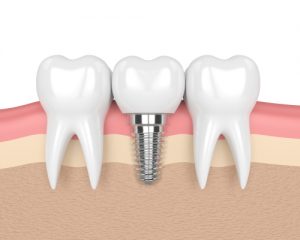A missing tooth or gap between teeth can prevent many people from smiling, laughing, or even speaking. They may cover their mouth or simply shy away from these activities when out in public. If you have tried using a removable bridge or denture and have been frustrated with the instability and constant maintenance, you may be interested in dental implants. These permanent replacements for missing teeth can help prevent further damage to the surrounding teeth and gums while providing a lasting solution to smile issues.

Not only can replacing missing teeth improve confidence, but it can also improve chewing and speaking, enhance oral health, and restore your facial appearance.
While dental implants and dentures are both considered acceptable methods of tooth restoration, dental implants have many advantages over dentures.
What Is the Difference?
Below is a brief description of both tooth replacement techniques:
- Dental implants: A titanium or zirconium implant is fused to the jawbone and serves as the tooth’s root. The implant is capped with a bridge or crown and provides natural-looking tooth replacement.
- Dentures: A removable piece designed to look like both the teeth and gums is used to replace the teeth and surrounding tissues. A complete set of dentures can be used when all teeth are missing, and partial dentures can be used where there are still some natural teeth remaining.
Why Are Dental Implants Better Than Dentures?
Both dental implants and dentures are commonly used in dentistry today. However, dental implants are superior in the following ways.
A Permanent, Durable Solution
The implant is fused to the jawbone and permanently placed in the mouth. Dentures are removable devices, and they can warp under hot water or break. Dentures may need to be adjusted, repaired, or replaced within seven years. Dental implants are secure, durable, and built to last a lifetime.
Optimal Function and Performance
Both dental implants and dentures are similar in function to normal teeth. However, dentures may slip or affect speech, which can be embarrassing or uncomfortable. Dental implants are associated with better chewing and speaking ability than dentures because they are embedded in the jaw like real teeth.
Better Hygiene
Dental implants can be brushed and flossed normally. Dentures must be removed for special cleaning. Not only is this inconvenient, but it leaves more margin for error in cleaning. Since dental implants require no special cleaning routine, they are a better option for oral hygiene.
Prevent Bone Loss and Gum Erosion
Dentures can cause the gums to erode and become flabby, and they offer no protection against jawbone loss. This can ultimately lead to your jawbone warping in shape, which can distort and prematurely age your facial appearance. Dental implants are fused to the jawbone, which prevents bone loss and deterioration of both the jawbone and the gums. You can retain your natural jaw shape and protect your smile with dental implants.
A More Comfortable Experience
Dental implants feel like natural teeth. Most people don’t even notice them once they are inserted. Dentures, on the other hand, can irritate the gums and cause mouth sores from the friction.
An Authentic Smile
Dental implants look completely natural and blend with the surrounding teeth. The new artificial tooth acts and looks like a real tooth while providing an overall smile makeover. Results can help regain confidence in your smile, and help you feel proud of your new teeth.
Who Can Get Dental Implants?
The first step is to determine if you are an ideal candidate for this procedure, which means visiting a qualified and trained cosmetic dentist to ensure that the bone in the area to be treated is sufficient and strong enough to hold a new tooth.
If there is weakening of the jawbone, a bone graft must be used to strengthen the area. Once this is complete, a titanium cylinder is permanently screwed into the jawbone to act as an artificial root. The area must then heal over three to six months to promote integration with the jawbone.
Following the integration of the new root, a ceramic tooth is permanently bonded to provide a natural-looking result. Dental implants can replace one or more teeth without the need for a bridge or dentures.
How Long Do Dental Implants Last?
Dental implants can last a lifetime; however, in order to maintain a healthy smile, it is important to follow healthy hygiene practices. Brushing and flossing at least twice every day can help prevent additional damage to the teeth. In addition, routine check-ups to monitor the implants and ensure that they are healthy and help prevent complications.

Feel free to browse through our before and after photos in our smile gallery to see how cosmetic dentistry provided by Dr. Sands may benefit you.
The best way to determine if dental implants are the best option for your particular needs is by scheduling an appointment at our Beverly Hills practice. Patients in the Los Angeles area interested in learning more about dental implants can schedule a consultation to learn more. Call 310.273.0111 or fill out our online contact form today.